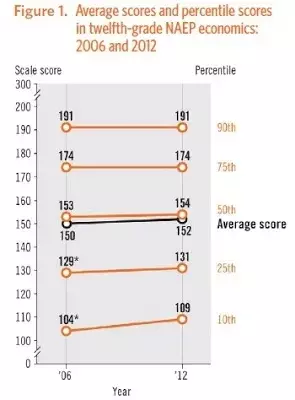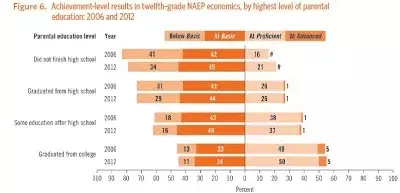Comments
- No comments found

How much do high schoolers know about economics?
The National Assessment of Educational Progress did its first economics test in 2006, and the U.S. Department of Education has also previously released the results of the 2012 follow-up test in ”Economics 2012: National Assessment of Educational Progress at Grade 12.” NAEP tests are carried out for a nationally representative sample of high school students.
I’ve never read the actual questions for an NAEP economics test. The report explains that the questions are categorized in three overlapping ways. There are three main content areas: the market economy, the national economy, and the international economy. The questions are also divided into three ”cognitive” categories: knowing, applying and reasoning. And the questions are divided into three assessment contexts: individual and household questions on topics related to earning, spending, saving, borrowing, and investing; business questions related to entrepreneurs, workers, producers, and investors; and public policy questions on domestic and international issues.
The results are not especially encouraging. About one-fifth of 12th-graders are ”below basic,” and the median score is ”basic” rather than ”proficient.” Here’s the overall performance in 2006 and 2012.

The modest gains from 2006 to 2012 are mainly at the lower end of the test score distribution.

However, performance on the economics test follows a pattern that is common across subjects: those with more educated parents tend to perform considerably better. I won’t enter here into the disputes over the extent to which these differences reflect family or social influences or differences in school performance. I’ll just note that children from families where the parents have lower levels of education are especially in need of a basic understanding of how the economy works at a personal and social level. Also, whatever the cause, education level is clearly one of the ways that families with higher socioeconomic status pass that advantage on to their children.

For those who want more detail on high school classes in economics, here's an article on ”High School Classes in Economics and Personal Finance.”
Timothy Taylor is an American economist. He is managing editor of the Journal of Economic Perspectives, a quarterly academic journal produced at Macalester College and published by the American Economic Association. Taylor received his Bachelor of Arts degree from Haverford College and a master's degree in economics from Stanford University. At Stanford, he was winner of the award for excellent teaching in a large class (more than 30 students) given by the Associated Students of Stanford University. At Minnesota, he was named a Distinguished Lecturer by the Department of Economics and voted Teacher of the Year by the master's degree students at the Hubert H. Humphrey Institute of Public Affairs. Taylor has been a guest speaker for groups of teachers of high school economics, visiting diplomats from eastern Europe, talk-radio shows, and community groups. From 1989 to 1997, Professor Taylor wrote an economics opinion column for the San Jose Mercury-News. He has published multiple lectures on economics through The Teaching Company. With Rudolph Penner and Isabel Sawhill, he is co-author of Updating America's Social Contract (2000), whose first chapter provided an early radical centrist perspective, "An Agenda for the Radical Middle". Taylor is also the author of The Instant Economist: Everything You Need to Know About How the Economy Works, published by the Penguin Group in 2012. The fourth edition of Taylor's Principles of Economics textbook was published by Textbook Media in 2017.
Leave your comments
Post comment as a guest